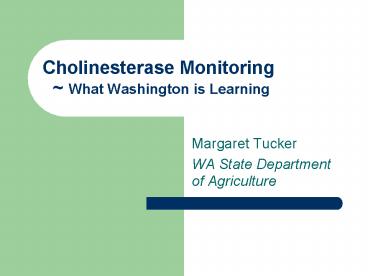Cholinesterase Monitoring What Washington is Learning - PowerPoint PPT Presentation
1 / 27
Title:
Cholinesterase Monitoring What Washington is Learning
Description:
WA Supreme Court required Labor & Industries to institute rulemaking for ... No respirator cartridge change out schedule or overuse of cartridges 13 ... – PowerPoint PPT presentation
Number of Views:32
Avg rating:3.0/5.0
Title: Cholinesterase Monitoring What Washington is Learning
1
Cholinesterase Monitoring What Washington is
Learning
- Margaret Tucker
- WA State Department of Agriculture
2
What Will Be Covered
- Program overview
- ChE results to date
- Findings of workplace investigations
- Training focus
3
Program overview
- Began in 2004
- Lawsuit brought by labor advocates
- WA Supreme Court required Labor Industries to
institute rulemaking for cholinesterase (ChE)
monitoring program - Agricultural employers only
4
Program overview
- Who must comply?
- Growers with employees who handle Category 1 or 2
organophosphate or N-methyl carbamate
pesticides
5
Program overview
- What must they do?
- Document hours of handling of covered pesticides
- Offer testing to employees who handle covered
pesticides
6
Program overview
- ChE Testing
- Baseline before handling covered pesticides
- Follow-up testing when exposure threshold met
- 2004 50 hours in consecutive 30 days
- 2005 30 hours in consecutive 30 days
7
Program Overview
- If ChE depression gt 20, employer must
- Perform an investigation of
- work practices
- clothes
- respiratory protection
- sanitation
- Keep a record of the investigation
- Record actions taken to correct problems
8
Program Overview
- If gt 30 decrease in red blood cell ChE or gt 40
decrease in plasma ChE - Work practice investigation by LI
- Employee temporarily removed from exposure
- Covered by medical removal protection benefits
- May return to handling tasks when ChE levels
within 20 of baseline
9
Program Overview
- With ChE depressions, symptoms are generally
reversed when - Exposure is stopped
- ChE levels increase
- No pesticide illness cases in WA as a result of
ChE depressions
10
Summary of ChE Monitoring Data
Total
11
Preliminary Data from 2005 Research
Investigations
- BACKGROUND INFORMATION
- 27 Employers - all pome fruit growers
- About 75 of the farms gt 500 acres
- About 1/3 had more than 10 handlers
- NOTE ADDITIONAL INVESTIGATIONS ONGOING
12
Preliminary Data from 2005 Research Investigations
- ChE-inhibiting pesticides handled by workers with
significant ChE depressions - Lorsban
- Sevin
- Guthion
- Carzol
13
Preliminary Data from 2005 Research Investigations
- Respiratory Protection
- No respirator cartridge change out schedule or
overuse of cartridges 13 - Using half-face respirator 17
- Improper fit-tests 3
- Wrong prefilters for oil 2
14
Preliminary Data from 2005 Research Investigations
- General Personal Protective Equipment (PPE)
- Spray glasses not chemical proof 1
- Cotton caps (7 wearing sweatshirt hoods also) 9
- Wearing bump cap 1
- Cotton gloves under nitrile 2
15
Preliminary Data from 2005 Research Investigations
- Decontamination
- PPE decontamination inadequate 11
- Application equipment decon inadequate 3
- PPE removed placed on
contaminated surface (e.g. tractor) 3
16
Preliminary Data from 2005 Research Investigations
- Decontamination
- Adjust respirator without glove decon. 1
- Smoking without washing/decon. 1
- Equipment used for other activities w/o
decontamination (e.g. tractor used w/o cleaning)
2
17
Preliminary Data from 2005 Research Investigations
- Handling Activities
- Eye flush supplies missing 3
- Eyewash supplies missing or not working 4
- Drift exposure (spray on face reported) 3
- WPS training cited inadequate 4
18
Preliminary Data from 2005 Research Investigations
- Change of clothes not provided 2
- Improper respirator storage 1
- No respiratory protection program 1
- Improper respirator maintenance 1
19
Preliminary Data from 2005 Research
Investigations
- Preliminary data highlights many factors making
simple conclusions difficult - Only evaluating employees with depressions
- How do their practices differ from those without
depressions?
20
Preliminary Data from 2005 Research Investigations
- AREAS OF CONCERN
- Wearing absorbent caps and/or half-face
respirators when applying Lorsban/oil tank mix
with airblast sprayers - Required PPE not available
- Improper use of PPE
- PPE decontamination inadequate or not performed
at necessary times
21
Preliminary Data from 2005 Research Investigations
- AREAS OF CONCERN
- Personal hygiene practices
- Equipment decontamination none or insufficient.
Multiple users w/varying practices - Safety standards/best practices not being carried
down the line
22
Training Focus
- At all levels
- Growers
- Safety officers
- Foremen and crew bosses
- Handlers
- Coordinated, partnership effort
- Industry, WSDA, WSU, DOH, LI, PNASH
23
Training Focus
- How?
- Train the Trainer
- Hands-On Handler Training
- Spanish/English Recertification Programs
- Washington State Horticultural Association
- Governors Ag Safety Day
- WSDA/WSU sponsored courses
- WSU Decontamination Video
- WSDA focused newsletter to ag employers
24
Training Focus
- Growers Handlers
- Emphasize personal, equipment and PPE
decontamination every time - Eliminate use of absorbent caps, etc.
- Convert to full face respirators where
appropriate - Follow farm safety policies
25
Training Focus
- Growers, Safety Officers, Foreman
- Communicate results of LI investigations
- Encourage them to
- Create and nurture a safety culture
- Develop, implement and actively enforce pesticide
safety policies - Ensure adequate availability, use and
decontamination of protective equipment
26
More Information
- Go to www.Lni.wa.gov
- Click on the Topics Index at the top of the page
- Find Cholinesterase
- Click on Cholinesterase monitoring
- Call 1-800-4BE-SAFE (423-7233) and select
pesticide blood testing - E-mail toug235_at_Lni.wa.gov English
- serp235_at_Lni.wa.gov Spanish
27
Thank You!
- Margaret Tucker
- WA State Dept. of Agriculture
- (360) 902-2015
- mtucker_at_agr.wa.gov
- agr.wa.gov/PestFert/































